
AlphaLISA Porcine IFN-γ Detection Kit, 5,000 Assay Points
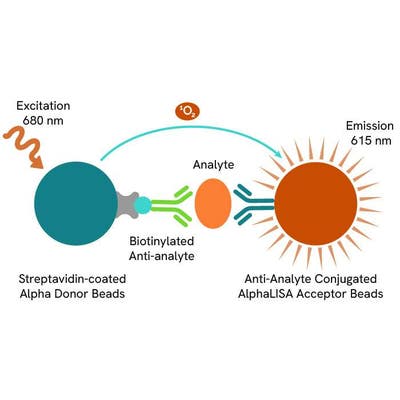

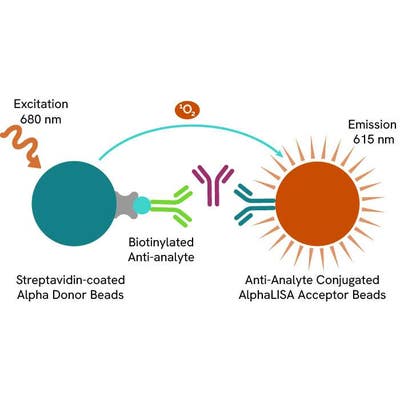 View All
View All
AlphaLISA Porcine IFN-γ Detection Kit, 5,000 Assay Points
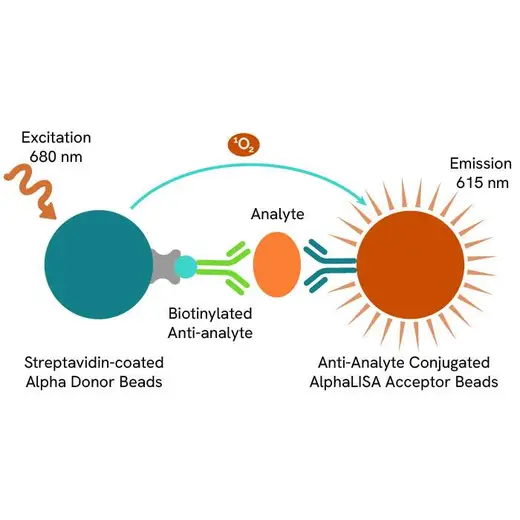

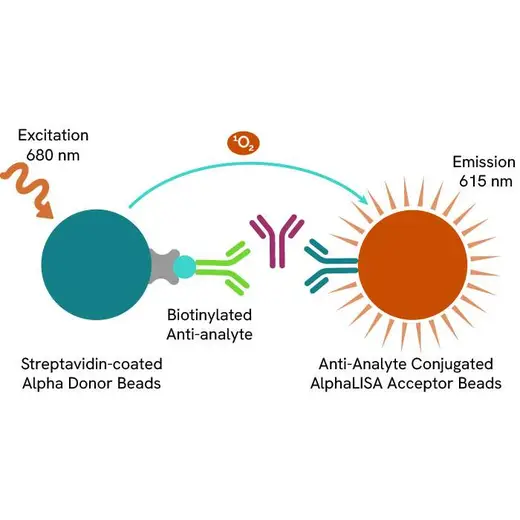




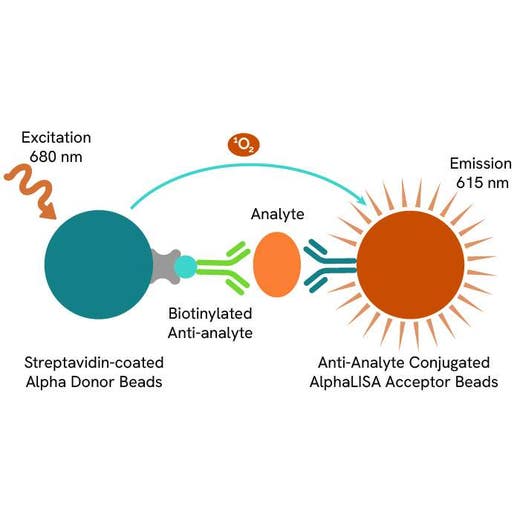

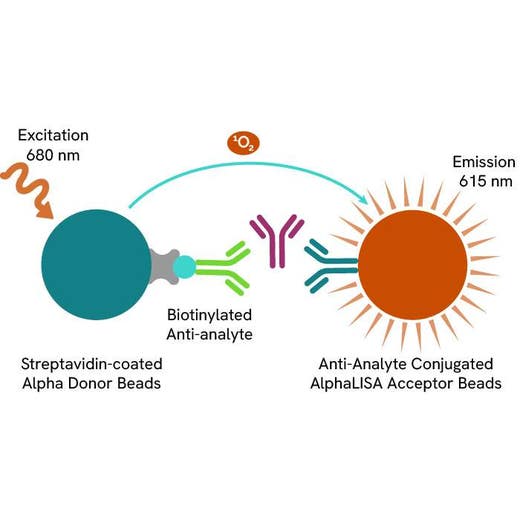




The AlphaLISA™ immunoassay kit for porcine IFN-γ enables the detection and quantitation of porcine interferon-gamma in serum, plasma, cell lysates, and cell culture supernatants using a homogeneous AlphaLISA assay (no wash steps). The assay shows no cross-reactivity with human, bovine, ovine, or equine IFNγ. Cross reactivity with other species has not been tested.
For research use only. Not for use in diagnostic procedures. All products to be used in accordance with applicable laws and regulations including without limitation, consumption and disposal requirements under European REACH regulations (EC 1907/2006).
| Feature | Specification |
|---|---|
| Application | Protein Quantification |
| Dynamic Range | 22 - 300,000 pg/mL |
| Limit of Detection | 22 pg/mL |
| Limit of Quantification | 129 pg/mL |
| Sample Volume | 5 µL |
The AlphaLISA™ immunoassay kit for porcine IFN-γ enables the detection and quantitation of porcine interferon-gamma in serum, plasma, cell lysates, and cell culture supernatants using a homogeneous AlphaLISA assay (no wash steps). The assay shows no cross-reactivity with human, bovine, ovine, or equine IFNγ. Cross reactivity with other species has not been tested.
For research use only. Not for use in diagnostic procedures. All products to be used in accordance with applicable laws and regulations including without limitation, consumption and disposal requirements under European REACH regulations (EC 1907/2006).







AlphaLISA Porcine IFN-γ Detection Kit, 5,000 Assay Points







AlphaLISA Porcine IFN-γ Detection Kit, 5,000 Assay Points







Product information
Overview
Formats:
- Our 100 assay point kit allows you to run 100 wells in 96-well format, using a 100 µL reaction volume (10 µL of sample).
- Our 500 assay point kit allows you to run 500 wells in 96-well or 384-well format, using a 50 µL reaction volume (5 µL of sample).
- Our 5,000 assay point kit allows you to run 5,000 wells in 96-well or 384-well format, using a 50 µL reaction volume (5 µL of sample).
Features:
- No-wash steps, no separation steps
- ELISA alternative technology
- Sensitive detection
- Broad sample compatibility
- Small sample volume
- Results in less than 3 hours
- Half the time of an ELISA assay
Porcine IFNγ, the only member of the type II interferon class, is a 20 -25KD homodimer glycosylated cytokine that is produced predominantly by natural killer and natural killer T cells as part of the innate immune response, and by CD4 and CD8 cytotoxic T lymphocyte effector T cells. It is critical for innate and adaptive immunity against viral, bacterial and protozoan infections, and is involved in tumor growth. In pigs, IFNγ is associated with autoinflammatory and autoimmune diseases and inhibits viral replication and bacterial infections. Porcine IFNγ has been identified as a biomarker for vaccine responses, viral, and bacterial infection. This kit is designed to detect pIFNγ in serum, plasma, cell culture supernatants, and cell lysates.
AlphaLISA technology allows the detection of molecules of interest in a no-wash, highly sensitive, quantitative assay. In an AlphaLISA assay, a biotinylated anti-analyte antibody binds to the Streptavidin-coated Donor beads while another anti-analyte antibody is conjugated to AlphaLISA Acceptor beads. In the presence of the analyte, the beads come into close proximity. The excitation of the Donor beads causes the release of singlet oxygen molecules that triggers a cascade of energy transfer in the Acceptor beads, resulting in a sharp peak of light emission at 615 nm.
Specifications
| Application |
Protein Quantification
|
|---|---|
| Automation Compatible |
Yes
|
| Brand |
AlphaLISA
|
| Detection Modality |
Alpha
|
| Dynamic Range |
22 - 300,000 pg/mL
|
| Limit of Detection |
22 pg/mL
|
| Limit of Quantification |
129 pg/mL
|
| Product Group |
Kit
|
| Sample Volume |
5 µL
|
| Shipping Conditions |
Shipped in Blue Ice
|
| Target |
IFNγ
|
| Target Class |
Biomarkers
|
| Target Species |
Porcine
|
| Technology |
Alpha
|
| Therapeutic Area |
Inflammation
|
| Unit Size |
5,000 Assay Points
|
Image gallery






AlphaLISA Porcine IFN-γ Detection Kit, 5,000 Assay Points






AlphaLISA Porcine IFN-γ Detection Kit, 5,000 Assay Points






Video gallery

AlphaLISA Porcine IFN-γ Detection Kit, 5,000 Assay Points

AlphaLISA Porcine IFN-γ Detection Kit, 5,000 Assay Points

Resources
Are you looking for resources, click on the resource type to explore further.
Leptospirosis is an infectious disease caused by Leptospira bacteria, which can spread across different species of mammals...


How can we help you?
We are here to answer your questions.






























